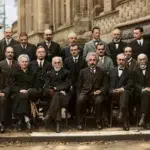Quantum Supremacy
Think Beyond the Moon Landing in the Quantum Supremacy Sprint, Cold War Tech Race 2.0!
The Soviet Union and the United States fought fiercely for supremacy in technology throughout the Cold War era. While the space competition garnered global attention, the fight for supremacy in quantum computing was taking place behind the scenes and was equally important.
Instead of racing to the moon, this was a race to explore the incredible possibilities of quantum mechanics, a world in which particles defy conventional physics and contain the secret to ground-breaking inventions. Let’s explore the intriguing background of the quantum technology competition during the Cold War and its potential future effects.
Table of Contents

Beyond Sputnik: Initiations of a Quantum Conflict
There was more to the Cold War than just bombs and missiles. Scientific advancement was strategically important, as both nations realized. While the space race made headlines, quantum mechanics research was developing in the background.
- The American Advantage: The foundation for comprehending and interacting with quantum systems was established by the early research of American physicists such as Richard Feynman and John Bardeen.
- The Soviet Reaction: Not to be outdone, the USSR launched extensive projects for quantum research, to which experts such as Nikolai Bogolyubov and Lev Landau made important contributions.
Both sides acknowledged the potential of quantum computing for military, materials research, and code-breaking applications despite their differing ideologies. In a way, the early development of quantum technology was spurred by the Cold War.
The Start of a New Era: Theory to Real World Technology
The development of quantum theory increased during the Cold War:
- The Development of Quantum Algorithms: Pioneers like as Peter Shor and Lov Grover created algorithms especially for quantum computers, demonstrating their ability to handle issues that are too complex for conventional computers.
- Constructing the First Qubits: Work on producing qubits, the fundamental units of quantum computing, accelerated. Trapped ions and superconducting circuits have emerged as viable technology for quantum state manipulation.
Although creating a complete quantum computer was still a long way off, the foundation for future advances was set. Though born out of a difficult geopolitical environment, the Cold War conflict unintentionally pushed the limits of quantum physics.
The New Terrain of Quantum: The Fall of the Wall, But Not the Race
The Cold War came to an official conclusion with the collapse of the Iron Curtain. But the competition for quantum supremacy didn’t end; it only assumed a different shape:
- International Competition: The US was not alone in its quest to create quantum technology; other nations involved were China, Japan, and the EU.
- Private Sector Entry: After realizing the enormous potential of quantum computing, tech behemoths like Google, IBM, and Microsoft started making significant investments in R&D.
The terrain may have changed, but the objective stayed the same: to reach quantum supremacy, the state in which a quantum computer can accomplish a given task better than any classical computer. The competition was now about 21st-century economic and technological domination, not just pride in one’s country.
The Quantum Future: Moving Past Cold War Encounters
The pursuit of quantum supremacy is still ongoing today, and new discoveries are always providing a window into the future:
- Early Applications Emerge: Specialized quantum algorithms are being created for applications such as drug discovery and materials science, even if a universal quantum computer is still years away.
- Future Prospects for Quantum Supremacy: Numerous groups assert that they have attained restricted variations of quantum supremacy, showcasing the capabilities of these devices for particular issues.
Even if the Cold War is no longer relevant, its influence on quantum computing cannot be ignored. That era’s intense rivalry has pushed us toward an exciting future full with opportunities.
A Quantum Advance for Humanity: Teamwork vs Rivalry
Although the competition for quantum supremacy is fascinating, there might not be victors and losers in the future. When quantum technology develops, cooperation will be essential:
- International cooperation: This complicated field will advance more quickly if resources and knowledge are shared.
- Ethical Considerations: Security, privacy, and the possible effects on society are important topics to explore given the enormous potential of quantum computing.
Although competition was encouraged during the Cold War, quantum computing will require a different strategy in the future. Nations and scientists can unleash this technology’s full potential by cooperating, bringing in a new era of scientific exploration and technological growth for the good of all.
The seeds planted during the Cold War tech race are starting to sprout, and the quantum revolution is almost here. The future looks bright, and it doesn’t revolve around one country winning; rather, it’s about using quantum physics to make everyone’s future better.


